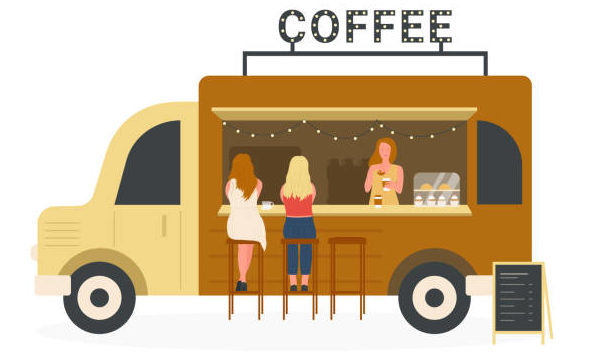post by Oliver Miles (2018 cohort)
Overview
In my first paper, ‘Interactions with CoffeeWizard’ I gave an account of participant interaction with a values-orientated choice and prediction framework, embedded through a coffee selection box activity in the home. It was originally submitted for the Computer Supported Cooperative Work (CSCW) 2021 conference, but despite feedback citing key points of merit including good alignment venue, a sound methodology, and agreement with the general line of argument, the paper was unfortunately rejected at first pass. Despite reading and re-reading the reviewer’s comments at the time, it is only now during the process of writing up a new study based on the same framework that I fully appreciate and can apply the suggested changes.
In the following, I will give an overview of the paper, the motivation for writing it and for specifically choosing the CSCW venue. I will then reflect on the more practical points of collaboration and advice during paper drafting, before outlining some of the feedback I received and how I intend to improve my next submission based on this. Hopefully, sharing some of my insights regarding responding to reviews can help others – particularly if they are writing their first paper as a solo author.
‘Interactions with CoffeeWizard’
Broadly, my thesis explores the use of discrete value sets such as product attributes and personal end-goals in life, as grounds for personalization in the recommendation of everyday coffee consumption. The purpose of my first study was to deploy a novel interaction framework for surveying, predicting, and eliciting retrospection on personal value preferences, elicited through coffee choice selection and reflected the participant as infographics. Realised through the initial questionnaire, coffee selection activity, and follow-up interview, this would allow me to demonstrate the kinds of interaction elicited at each stage of the framework and improve the proposition so that it captures this as rich, contextual data. The study was delivered as a domestic deployment due to Covid-19 restrictions at the time. In the findings, I present and discuss the results of interviews with 12 participants, whose reflections enabled a discussion based on the emergent, practical values of selecting coffee based on its reputed value attributes and making choices incongruent/congruent with apparent predictions.
Motivations
In terms of motivation for the paper, I wanted to share my theoretical ideas with peers in the human computer interaction (HCI) community whose work tends towards testing and developing prototypes. I chose the CSCW conference as it positions itself as ‘…a premier venue for presenting research in the design and use of technologies that affect groups, organizations, and communities’[1], which is well aligned with the practicalities of incorporating social research and HCI methodology. More broadly, this was my first opportunity to formally share ideas with an HCI audience whose common idioms can be challenging to adopt when approaching the field from another discipline.
Paper preparation
If you are completely new to paper writing like I was for this piece, I would recommend attending any of the Research Academy courses related to effective writing as soon as you get the opportunity. Paper writing is fundamentally different in my experience from other forms of academic writing as it requires your work to retain its originality while at the same time reflecting the nuances of the conference or journal, not to mention strict formatting and editorial guidelines. Supervisor feedback is therefore also crucial during the drafting process. It can be tempting to wait until you have entire finished sections or even a full draft before you seek feedback. To counter this, I have found that the following ‘skeleton paper’ approach works for me:
-
- Outline the known section headings from ‘introduction’ to ‘conclusion’
- Break these down further into the main substantive points you wish to cover
- Ensure there is a clear narrative that will bring your reader to the intended contribution
This can effectively read as a full draft while allowing efficient iterations, which can be further substantiated once the main concepts and contributions become coherent.
Handling Reviewers’ Comments
It is easy in hindsight to see the extent to which I was/was not following my own advice regarding paper preparation. On the one hand, reviewers picked up on some key merits which resonated with my intended contribution: The proposition appeared to give ‘insightful’ findings; the issue of value-based personalization was agreed as a relevant interactional one, and the methodology itself was judged to be appropriate. These points were generally very encouraging given the wider implication of the validity of my thesis.
Nevertheless, under-developed contributions and literature selections were significant enough to result in rejection. In the first case, I reflect that I had not invested enough in the preparation of the paper specifically, a paper for the CSCW audience. This left reviewers with a sense that they were being left to draw out findings relevant to them, instead of having them clearly outlined. This is intrinsically linked to the second concern regarding literature selection. I had only referenced one CSCW publication, with the rest of my sources coming from other conferences or journals. So, while the material I based my work on was described as ‘relevant’, it made it difficult for reviewers to link any contribution back to work specifically emanating from the venue itself.
Role of paper within PhD
‘Interactions with CoffeeWizard’ continues to play a significant role in my thesis as the first deployment of a novel, values-orientated personalization framework. Expanding on the literature section and aligning the contribution more closely with contemporary works from CSCW, the work now forms the first empirical chapter of my thesis. In this sense, I hope that reviewer feedback has improved the communication of my work for my PhD itself, as well as informed me how I am currently approaching write-up of my final study to a similar venue in 2023.

